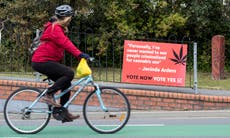New Zealand election: Jacinda Ardern wins by landslide after calm coronavirus response
Labour Party leader has been lauded for her handling of the pandemic
Your support helps us to tell the story
From reproductive rights to climate change to Big Tech, The Independent is on the ground when the story is developing. Whether it's investigating the financials of Elon Musk's pro-Trump PAC or producing our latest documentary, 'The A Word', which shines a light on the American women fighting for reproductive rights, we know how important it is to parse out the facts from the messaging.
At such a critical moment in US history, we need reporters on the ground. Your donation allows us to keep sending journalists to speak to both sides of the story.
The Independent is trusted by Americans across the entire political spectrum. And unlike many other quality news outlets, we choose not to lock Americans out of our reporting and analysis with paywalls. We believe quality journalism should be available to everyone, paid for by those who can afford it.
Your support makes all the difference.Jacinda Ardern has won a landslide victory in New Zealand’s general election as voters rewarded her for an effective response to the coronavirus pandemic.
Ardern, 40, can now form the first single-party government in decades. She faces the challenge of delivering on the progressive transformation she promised but failed to deliver in her first term, in which Labour shared power with the nationalist New Zealand First Party.
After her party won 49.1 per cent of the votes and a projected 64 of 120 seats on Saturday, Ardern said: “Tonight New Zealand has shown the Labour Party its biggest support in 50 years.
“We have seen that support in urban seats and rural seats and seats we may not have expected. And to that I have only two words: thank you.”
She added: “This is not an ordinary election and this has not been an ordinary time,” and urged New Zealanders to “step forward together”.
“As a nation, we can listen, we can debate... we are too small to lose sight of other people’s perspective,” Ardern said.
The Maori Party gained the lead in one of the seven Maori MP electorates. Ardern began and ended her speech in te reo Maori – Maori language.
On stage, she said: “To those amongst you who may not have supported Labour before – and the results tell me there were a few of you – to you I say thank you. We will not take your support for granted. And I can promise you we will be a party that governs for every New Zealander.”
This is the first outright majority government since New Zealand adopted a mixed-member proportional voting system (MMP) in 1996. In the MMP system, voters are asked to vote twice – once for their preferred party and the second time for an electorate MP.
A party or coalition in New Zealand requires 61 seats in a parliament of 120 – around 48 per cent of the vote – to form a government.
Minor parties often play an influential role in determining the result and more recent polls suggested Ardern would need the continued support of the minor Green Party, led by James Shaw.
Ardern and opposition leader Judith Collins, 61, of the centre-right National Party, faced off in the election to form the country’s 53rd parliament following Ardern’s three-year term.
As the US election looms closer, Ardern said on Saturday that elections “do not have to be divisive”.
The National Party, which won 26.8 per cent of the vote, campaigned on assertions of better economic management. Ardern’s Labour Party slogan was “Let’s keep moving” as they campaigned as one of the most successful countries in their handling of Covid.
Out of Labour’s current coalition partners, the nationalist New Zealand First Party won 2.7 per cent of the vote and the Green Party won 7.6 per cent.
Despite her successful handling of the pandemic, Ardern’s party have challenges ahead – New Zealand is now in its worst recession in decades.
The election was delayed by a month due to a surge of infections in the country’s largest city, Auckland.
Ardern implemented a second lockdown in the city after a family of four tested positive for the virus on 11 August, leading to the largest cluster of infections in the country.
It remains the case that only New Zealand residents, citizens and their parents and partners are allowed to enter the country.
The country, with a population of five million, boasts no community cases and is one of the few nations that doesn’t require mandatory mask-wearing and social distancing in public spaces.
Throughout the pandemic, there have been 25 deaths and under Ardern’s government, fewer than 2,000 cases have been reported.
Ms Ardern’s government have led with a “zero Covid strategy” which involves an effective test, trace, isolate and support system praised by scientists.
New Zealanders on Saturday were also asked to vote in two referendums, one on legalisation of cannabis and another on euthanasia.
The country could become the third nation to legalise marijuana, after Uruguay and Canada.
The results will be announced on 30 October.






Join our commenting forum
Join thought-provoking conversations, follow other Independent readers and see their replies
Comments